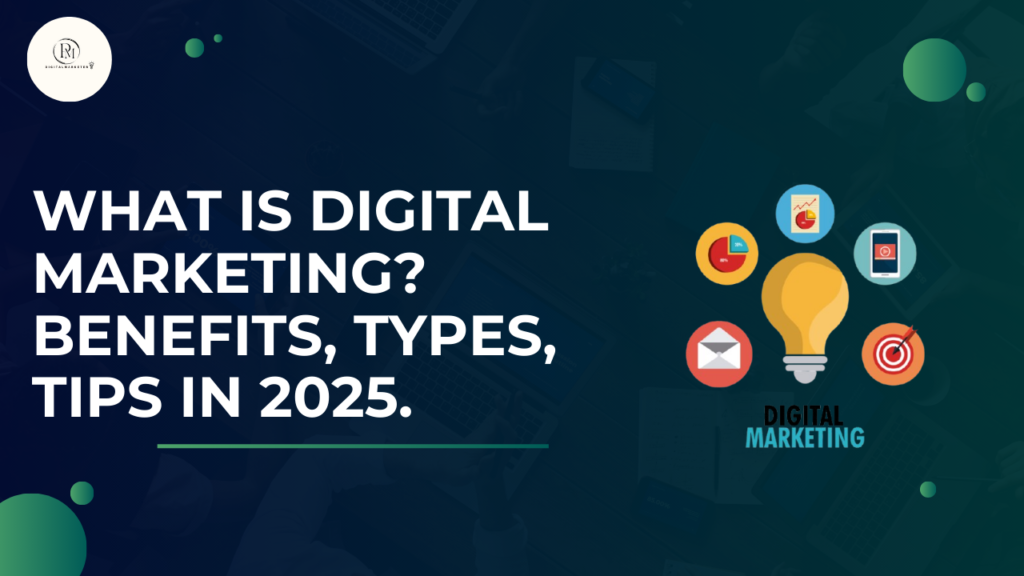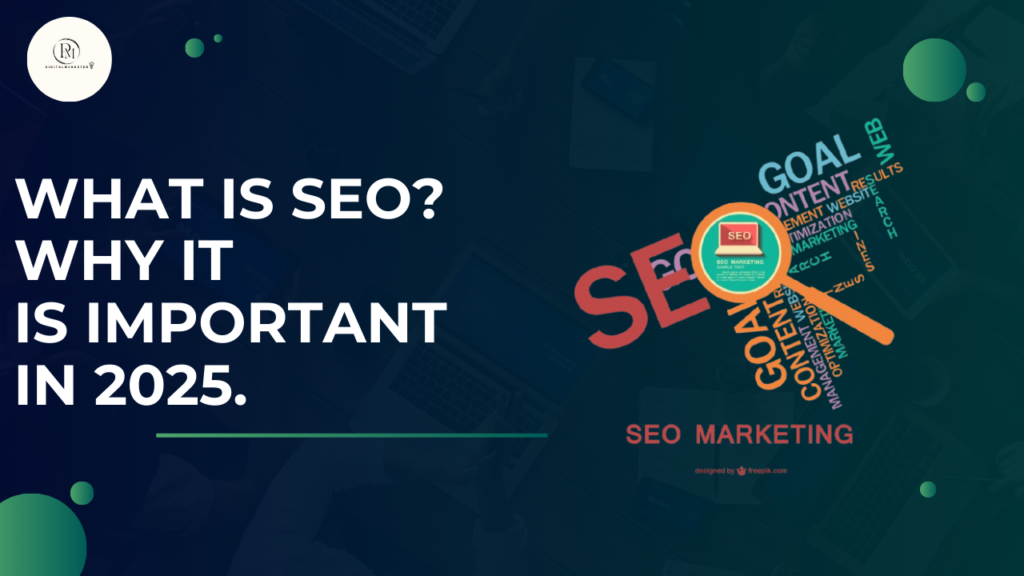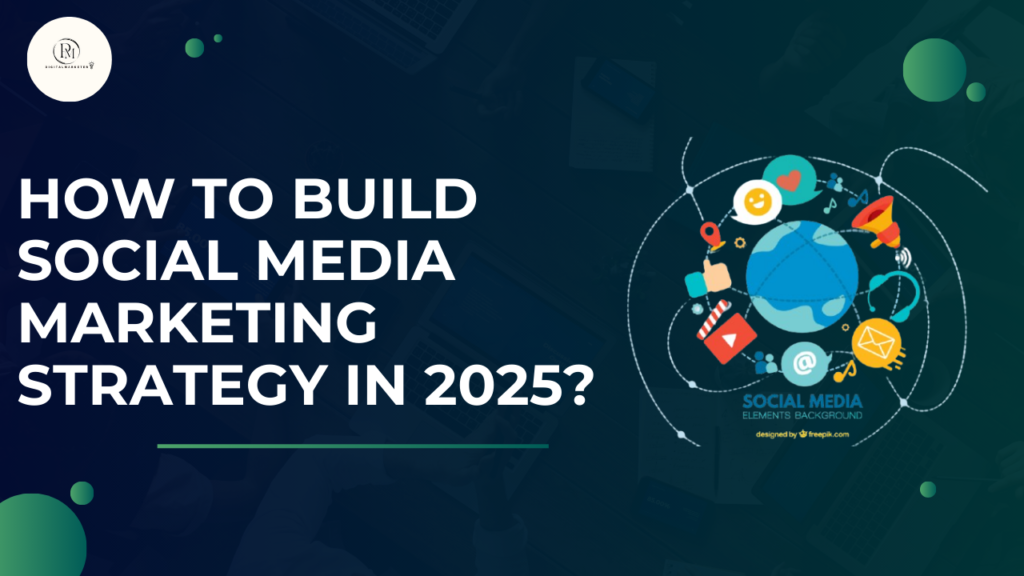What is digital marketing? benefits, types, and tips in 2025.
What is digital marketing ? Digital marketing refers to the use of online platforms, tools, and technologies to promote and advertise products or services. Unlike traditional marketing methods, digital marketing relies on the internet, social media, search engines, email, and other digital channels to reach a targeted audience. The key advantage of digital marketing is its ability to precisely track and measure campaign effectiveness. By using strategies like search engine optimization (SEO), pay-per-click (PPC) advertising, content marketing, and email marketing, businesses can increase brand visibility, drive traffic to their websites, and foster better engagement with potential customers. With digital marketing, businesses can leverage analytics to gain insights into customer behavior, allowing them to optimize campaigns in real-time. A strong digital marketing strategy is essential for staying competitive, as it helps align online marketing efforts with broader business objectives. As the digital landscape continues to evolve, businesses that embrace digital marketing will be better positioned to reach and convert their audience in more impactful ways. Benefit of digital marketing in 2025? The benefits of digital marketing in 2025 will continue to grow as new technologies emerge and customer behaviors shift. One of the key benefits is digital marketing analytics, which allows businesses to measure campaign performance in real-time. This data-driven approach enables businesses to make informed decisions and adjust strategies quickly. With an increasing reliance on online interactions, having a well-crafted digital marketing strategy will be crucial for success. In 2025, digital marketing will continue to be a cost-effective solution for businesses of all sizes. Compared to traditional marketing, digital marketing offers a lower barrier to entry and allows companies to reach a global audience with targeted campaigns. Furthermore, the personalization capabilities of digital marketing will be enhanced, enabling businesses to create highly tailored content and ads that resonate with individual consumers. Optimization boosts campaign performance. As the world moves toward increased automation, digital marketing consultancy will also play a significant role in helping businesses leverage AI and automation to optimize their online presence. Overall, embracing digital marketing in 2025 will enable businesses to remain agile, competitive, and customer-focused. With the help of digital marketing experts, businesses can tap into the power of AI to automate tedious tasks, freeing up time for more creative and strategic efforts. Types of Digital Marketing There are several types of digital marketing strategies that businesses can utilize to connect with their target audience. Search engine optimization (SEO) is one of the most effective ways to improve organic search visibility and drive traffic to a website. By optimizing website content, metadata, and backlinks, businesses can rank higher on search engine results pages (SERPs), attracting more potential customers. Pay-per-click (PPC) advertising is another popular digital marketing tactic. With PPC campaigns, businesses can target specific keywords and demographics, paying only when users click on their ads. Social media marketing is also essential, as platforms like Facebook, Instagram, and LinkedIn provide unique opportunities for engagement and brand building. Additionally, content marketing is a vital aspect of digital marketing, focusing on creating valuable and relevant content to attract and retain a defined audience. Email marketing also remains an effective strategy for nurturing customer relationships and driving conversions. The combination of these different types of digital marketing creates a robust and multifaceted approach to online promotion. Key Digital Marketing Tips for Success in 2025 To succeed in digital marketing in 2025, businesses need to continuously adapt to new trends and technologies. A key component of success is having a strong digital marketing strategy that incorporates automation and personalization. With the increasing use of artificial intelligence (AI), marketers can leverage data to deliver tailored content and ads to individual users, enhancing the customer experience and improving conversion rates. Another crucial tip is to focus on digital marketing analytics. Monitoring metrics like website traffic, engagement, and conversion rates will allow businesses to measure the effectiveness of their campaigns and identify areas for improvement. Additionally, mobile optimization is essential in 2025, as more consumers access websites through their smartphones and tablets. Content remains at the heart of successful digital marketing efforts. Businesses should invest in high-quality content creation, including blogs, videos, and infographics, to engage their audience. Finally, keeping an eye on emerging trends, such as voice search optimization and interactive content, will help businesses stay ahead of the competition and maintain relevance in the digital space. local SEO & its importance in 2025 Local SEO is an integral part of digital marketing, especially for businesses with a physical location or those targeting local customers. In 2025, the importance of local SEO will continue to rise as consumers increasingly rely on mobile devices to search for nearby businesses and services. Optimizing your website for local search queries ensures that your business shows up in search engine results when people look for services in their area. To improve local SEO, businesses should focus on claiming and optimizing their Google My Business listing, ensuring accurate business information like address, phone number, and business hours. Additionally, encouraging customers to leave reviews on Google and other review platforms can help boost local rankings. Digital marketing analytics also plays a key role here, as it allows businesses to track local search performance and adjust strategies accordingly. Investing in local SEO in 2025 will allow businesses to gain better visibility in their communities, drive foot traffic, and build stronger relationships with local customers. It’s an essential component of any digital marketing strategy for businesses seeking to thrive in their local markets. By optimizing for local search, businesses can ensure they show up when potential customers are searching for nearby products or services. Local SEO builds stronger customer relationships. The Rise of Podcasting for Brands Podcasting has become an increasingly popular medium for digital marketing in recent years, and this trend will continue in 2025. As more consumers turn to podcasts for entertainment and education, brands have a unique opportunity to reach their target audience through audio content. Podcasting allows businesses to share their expertise, tell brand stories, and engage
What is digital marketing? benefits, types, and tips in 2025. Read More »



